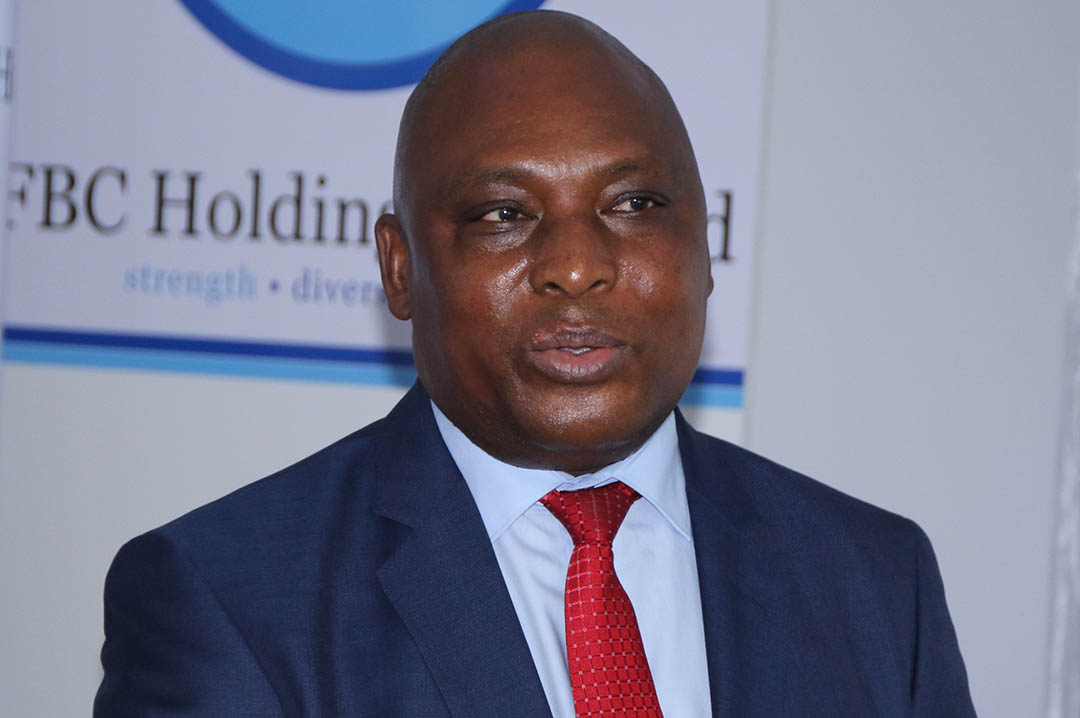
RBZ Governor Mushayavanhu ready to interface at Manicaland Monetary Policy Review breakfast meeting
April 24, 2024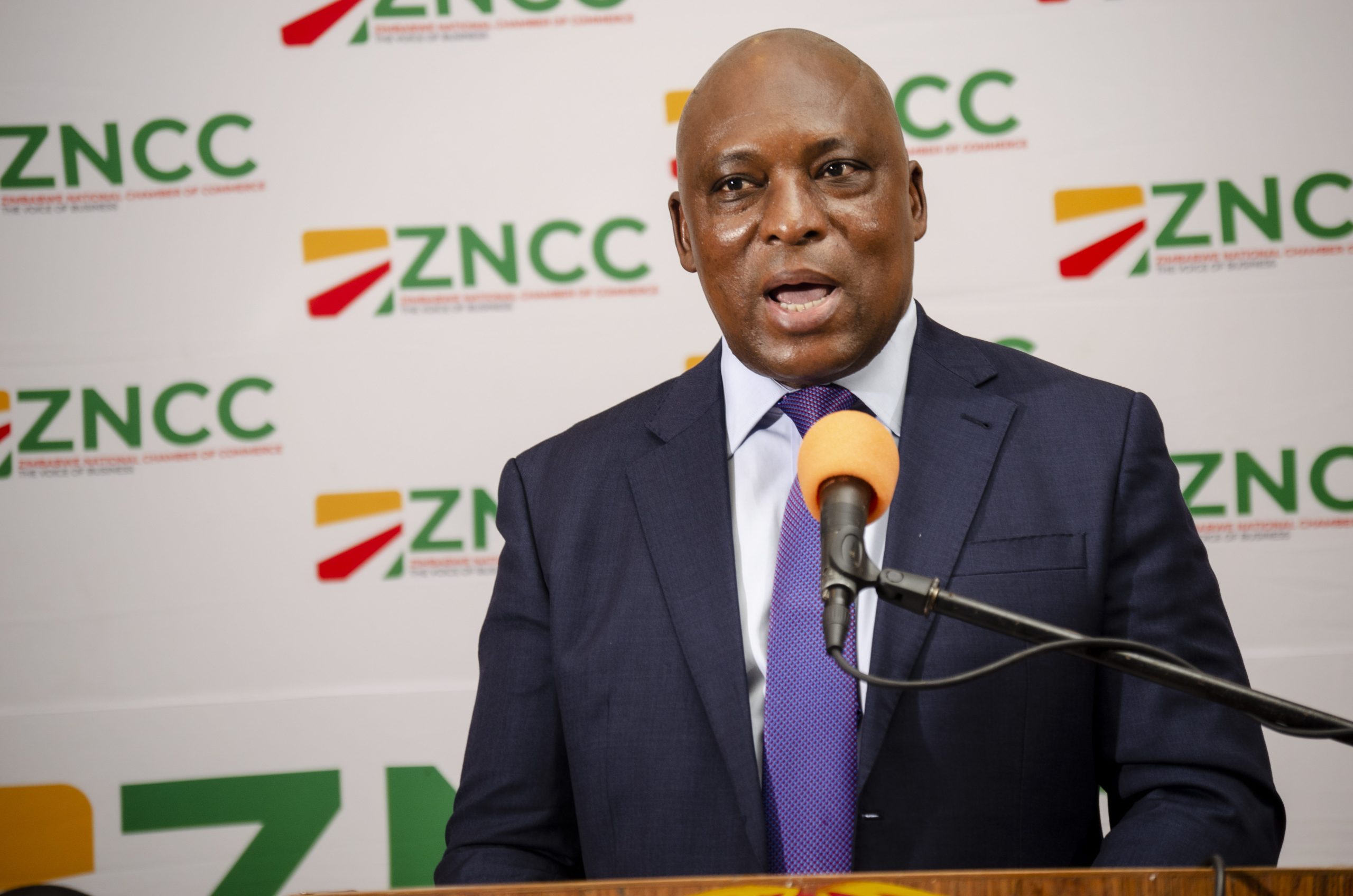
50% payment in ZiG of QPD will compel fuel suppliers to sell some fuel in ZiG: RBZ Governor
April 30, 2024Msabaeka Manicaland’s pioneering businessman, philanthropist and liberation war collaborator laid to rest as a Provincial Liberation War Hero
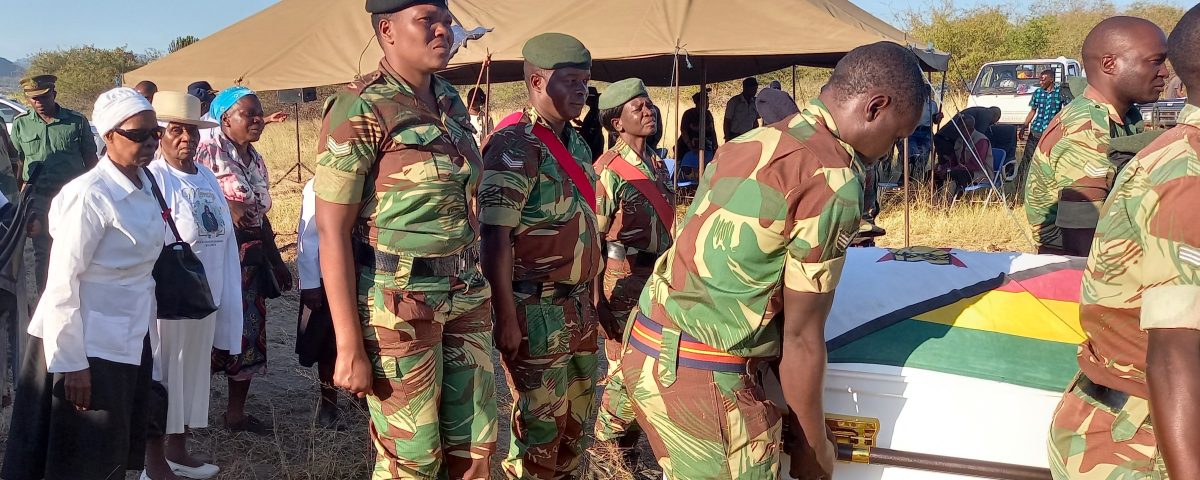
The wife of the late Enock Msabaeka, Jane Derera-Msabaeka (centre with hat) getting ready for the military parade escort to bury her husband at his last resting place at Msabaeka Farm in Mutasa on Wednesday.
…Family promises to uphold his legacy
Ngoni Dapira
WHATS in a name? When the famous playwright William Shakespeare asked the question in his book, “ Romeo and Juliet,” he was referring to the idea that names themselves are a convention to distinguish things or people.
This was the question asked at the burial of the late pioneering, astute businessman, philanthropist, civic activist and former Mayor of Mutare (1984-1991), Enock Samson Msabaeka, who was declared a provincial liberation war hero, but buried at his Msabaeka farm in Old Mutare, Mutasa District on Wednesday.
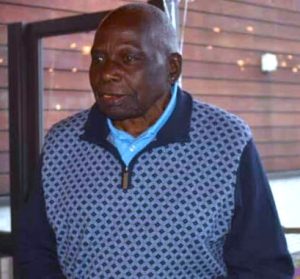
The late Enock Msabaeka
Msabaeka passed away on Monday after a long illness at the age of 91.
Born and bred in Chipinge, the shrewd pioneering public transport mogul of Msabaeka Bus Services, which was amongst the first black (indigenous) owned bus services in Manicaland before independence, grew to become a household name in Mutare and Manicaland at large.
The late Msabaeka was not only a successful businessman but was also a farmer and educationist as well as a devout Christian who was very instrumental in growing the United Church of Christ in Zimbabwe (UCCZ) in Manicaland.
Apart from his trademark bus service business of locally assembled buses, back then colloquially called chicken buses and luxury coach buses, the late Msabaeka built a business empire that included running a large portfolio of real estate, farms, a laundry and dry cleaning company and a successful logistics company.
Described as a proud Ndau descendant, an ethnic group which inhabits the areas in south-eastern Zimbabwe in the districts of Chipinge and Chimanimani, Msabaeka was found worthy to be conferred a Provincial Liberation War Hero, honouring his contribution as a collaborator through his support of liberation war fighters with food and clothing, as well as his civic activism on equal rights for black people in business during the colonial era in Rhodesia.
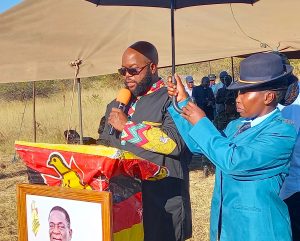
Minister Mugadza
The Minister of State for Manicaland Provincial Affairs and Devolution Advocate Misheck Mugadza thanked President Emmerson Mnangagwa for acknowledging the late Msabaeka and said his rich legacy should inspire present-day youths that good deeds and patriotism towards the country do not go unnoticed and eventually get rewarded.
“The late Enoch Msabaeka was a staunch supporter of Zimbabwe’s liberation struggle. He made immense material and financial contributions to the cause. He and his colleagues like the late Robert and John Zvinoera, collected and supplied material support for political detainees detained at Gonakudzingwa and Hwahwa detention camps,” said Minister Mugadza in his eulogy as the chief mourner.
Adding, “During the liberation struggle, the late E.S Msabaeka was heavily involved in the procurement and supply of provisions such as clothing, shoes, denim jeans, food, medicines and other essential items for the combatants. Through his business as a bus operator E.S Msabaeka provided transport and logistical support for recruits from Manicaland Province to Chipinge and assisted them to cross into Mozambique through the Mt Selinda area. He coordinated the procurement of supplies and provided logistical support for both new recruits and combatants operating in the war zone.”
As a civic activist, Minister Mugadza said the late Msabaeka in 1967 staged a protest at the then Netherlands bank (now ZB Bank) after he had been denied access into the bank through the front entrance that was reserved for whites only at the time. This was regardless of him being a consistent client at the bank and a businessperson in his own right.
“The late E.S Msabaeka, staged a one man protest, threatening to withdraw all his money and close his account with the bank. It was only after his protest that the bank officially conceded and started to allow black customers to use the same front entrance as the white customers,” said the chief mourner whilst narrating his obituary.
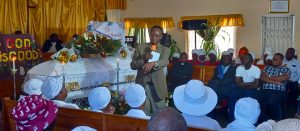
Edgar Seenza
Speaking at the church service at UCCZ, the Provincial Affairs and Devolution Permanent Secretary for Midlands Province, Edgar Seenza, who is the former Manicaland Provincial Development Coordinator said Manicaland had lost a fatherly figure that always advocated for developmental growth in Manicaland.
“He was like a father to me because he was my father’s friend. I was like part of the Msabaeka family growing up in Chirinda. His love for this province was undeniable and he proved it through his works of growing his business empire in Manicaland and nurturing others that came to him for assistance,” said Seenza.
From humble beginnings the late Msabaeka born on the 15th December 1933, was the eighth son of Shayanewako Msabaeka and Mvuyase Dzingire. He did his primary and secondary education in Chipinge at Shekwa Primary School and Mt Selinda Secondary School respectively.
He went on to do his vocational training at Mount Selinda Training Centre. After his training at Mt Selinda, he qualified as a carpenter in 1954 and started teaching carpentry in Chipinge at Gwenzi Primary School in 1955. In 1956 he moved to Old Mutare Mission (now known as Hartzell) in Mutasa where he taught carpentry till 1959.
The late Msabaeka bought his first bus in 1959 and in the same year got married to Jane Nkomo Derera-Msabaeka. Though born and bred in Chirinda in Chipinge, the late Msabaeka decided to move to Mutsago village in Bocha, Marange in 1959 when he got married, which is where he raised his own family for the greater part of his children’s upbringing.
The first born, Rudo Msabaeka-Mutseyekwa, said he was a loving father who was passionate about being a Ndau descendant, always encouraging his children to remember their roots besides having migrated to Bocha.
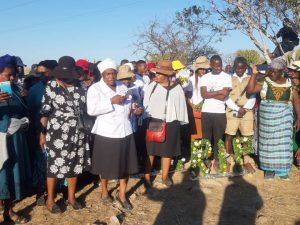
Rudo Msabaeka-Mutseyekwa (holding cellphone) at the burial shrine.
“In 1959 our father got married in Chirinda where he was born but we later migrated to Bocha. As children we grew up in Mutsago in Bocha. We salute our father who taught us to work hard and to be respectful customarily. He was a loving father who wanted to grow his Ndau lineage and encouraged his children to speak Ndau to the extent that he even wanted us to only get married to people of Ndau lineage,” she said jokingly. “But most of us winded marrying or getting married to maZezuru,” as she cracked a joke.
In 1981 the late Msabaeka bought a commercial farm, Msabaeka farm in Old Mutare in Mutasa, to spread his business empire into farming. This is where he was laid to rest.
After independence, the late Msabaeka continued with his involvement as a civic activist. He was elected as councilor for the city of Mutare and in 1984 he was appointed as Mayor of city of Mutare, a position in which he served with distinction for a period of seven years. He became the second black Mayor of Mutare after independence, following the tenure of Davidson Jahwi who served from 1980 to 1984. The term of office for Mayor’s was four years back then.
The late Enoch Msabaeka sat on many Boards of Directors in business. He was appointed to the Board of Directors for the Reserve Bank of Zimbabwe (RBZ) becoming one of the very first black businessmen to be appointed to this position.
He also sat and served as a board member of many distinguished companies such as Beverly Building Society, Zimbabwe Insurance Brokers and SARE (Southern Africa Reinsurance). For a period of 25 years the late Msabaeka also served as the secretary general of the Zimbabwe Rural Buss Operators Association as well as a member and chairman of the Mutare Rotary Club for many years and chairman of the Manicaland chapter of the Red Cross for more than 10 years.
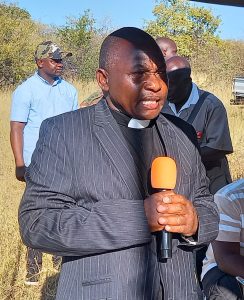
Rev Farai Msabaeka
His eldest son Reverend Farai Msabaeka promised to uphold his legacy. “This is not the end of our father’s legacy, but we will continue where he left. Msabaeka farm will continue to thrive and we will continue to uphold what he spent his whole life working for as a businessman. We also thank the President for the honour bestowed on our father,” said Rev Msabaeka.
Business colleagues, friends and family from all walks of life came to pay their last respect to the shrewd businessman. The late Msabaeka initially had six children with his wife Jane namely, Rudo, Sithembile, Farai, Gondai, Tendai and Tanyaradzwa, but Sithembile passed away.
He is survived by his wife Jane, five children, 28 grandchildren and seven great grandchildren.


